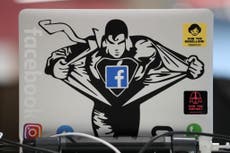No one is outraged about Cambridge Analytica – they are angry about Trump and Brexit
Cambridge Analytica did not make the rule that the most charismatic candidate always wins. It just knows how to exploit it better than anyone else


A friend first told me about a company called Cambridge Analytica a week after Donald Trump’s election.
He said they were a data company that helped political campaigns produce highly precision-targeted Facebook ads. They’d worked on both the Trump campaign and the Leave campaign.
I wasn’t in the slightest bit shocked, then. If I’m honest, I can’t work out if I am meant to be shocked, now.
It certainly appears that lines have been crossed, duties of care breached. Data has perhaps not been sufficiently protected by Facebook. A company may have acquired data about Facebook users under one pretext, and then sold it on to another with an intention to use it rather differently. Cambridge Analytica appears to have Facebook data on people who have not agreed to share it with them.
But, to the very best of my knowledge and understanding, Cambridge Analytica, or indeed any company like them, cannot have access to any data on any person, which that person has not willingly shared both with one of the world’s largest corporations (Facebook itself), and usually with several hundred other people (their Facebook friends).
If you wish to play a game on Facebook that involves something as mundane as guessing the capitals of the world, it is readily apparent the price you pay to do so is handing over your personal information.
Like many tragic men of a certain age, about 18 months ago I bought an Amazon Alexa (I assume there are many tragic women too, but I don’t know any), an indulgence which has, for no reasons beyond my own fundamental patheticness, extended itself into all manner of smart home gadgets. Light bulbs, thermostats, ridiculous little buttons, etc.
In that 18 months, I have noticed myself constantly pausing on Facebook ad videos selling products that they have somehow worked out I am pathetic enough to be interested in.
For a little while, I cared a bit that some algorithm knew my interests – not least as some algorithm was on to the fact that I had become an unconscionable loser.
But I decided it was no greater moral breach than the targeted adverts for walk-in baths and life insurance plans with free parker pens that cram the ad breaks on Countdown.
As new technologies come, those with products to sell will always find the best way to get those products in front of the most susceptible eyeballs. Capitalism has always been thus. Indeed if it was not, it wouldn’t be capitalism at all.
Political campaigning has always been identical. No moral line is crossed when a would be President or Prime Minister goes to a swing state or marginal constituency and hones in on local issues.
And in the end, the only facet of your life that Cambridge Analytica has power of influence over are the ads you see on your Facebook feed.
There are separate but related questions – for example, concerning Facebook’s Newsfeed algorithm, which rewards engaging content, tempting political parties to produce ever more sensationalist material, realigning people in the information age into a guard of honour for demagogues like Donald Trump to walk down.
But the underlying principles have surely not changed. Show me the last election, at least in the UK or the US, that was not won by the more charismatic candidate? Where getting people’s attention was not the heart and soul of the matter?
In the Presidential debates in 2016, Donald Trump made a large number of wild and utterly false claims. Hillary Clinton answered with such phrases as, “I think the fact checkers are going to have fun with that one.” It is the sort of answer that intimates at a life spent so deep in the political bubble that one wonders if she had ever come up for air.
People have almost entirely forgotten that, say, in 2015, when the BBC hosted its first hustings in the Labour leadership contest in a church in Nuneaton, some hitherto unknown man called Jeremy Corbyn was the only one who had anything of any interest to say. Andy Burnham, Yvette Cooper and Liz Kendall were beyond abysmal, and they remained so throughout the contest.
Is it acceptable to wonder if the fire is only being turned on technology because it hasn’t delivered the results the bulk of the media class wanted? If the Democrats had delivered a candidate better equipped to deal with the shallowness of the media age, and if the Remain campaign had been run as well as the Leave one, this apparently existential crisis would not be occurring.
When two seismic but extremely close results appear to change the world, any number of factors can be viewed as decisive. It is so very easy to forget – we are only talking about ads on Facebook.
Liberal newspapers and the like appear terrified that the rise of Facebook means liberal newspapers have lost control of the national conversation. That, through the power of the web, the idiots in every village have all found one another, and together through the self re-enforcing power of their own editorially unscrutinised information, they suddenly have critical mass enough to march the world over the cliff.
There appears generalised despair in the media at the end of what it imagines to be some sort of golden age, when the political class was kept in check by the media class. When the national conversation was set by those with the cash to set its terms. Horizontal democracy played second fiddle to vertical democracy. Where everyone has the right to speak, but only those with money have a right to be heard.
When I was 18 years old, I worked behind the bar of a pub in which the regulars all worked at the Dagenham Ford factory, and most of them had to hand in their passports during England away matches. The conversations were drivel. Endless drivel. The opinions were outrageous. The facts were utter garbage.
I often wonder whether the “crisis” is merely that by virtue of being addicted to Twitter, the mainly middle-class media is horrified not by a new problem, but because a very old one has suddenly wandered on to its horizons.
Back then, I think it is reasonable to say, The Sun sold far more copies and it contained stories that were palpably absurd, which it would never get away with now. There has always been fake news, and there has always been a willing and malleable audience for it. It’s just that it’s consumers weren’t spending their evenings arguing via their smartphones with a lot of people who were hitherto all but unaware of their existence.
Nothing lasts forever. In the fullness of time, if humankind can stay alive for long enough, the radical, charismatic ideas will be coming again from a place that the liberal class finds morally acceptable. And when that happens, you’ll be reading just as much about the dubious power of precision data analytics as you did during eight long years under a nice young man who once, via the power of the internet, won a presidential election from absolutely nowhere: Barack Obama.





Join our commenting forum
Join thought-provoking conversations, follow other Independent readers and see their replies